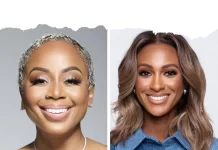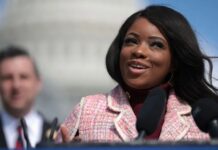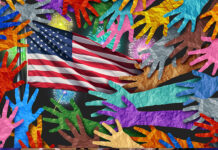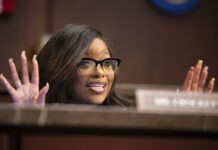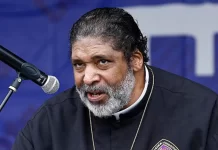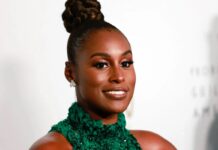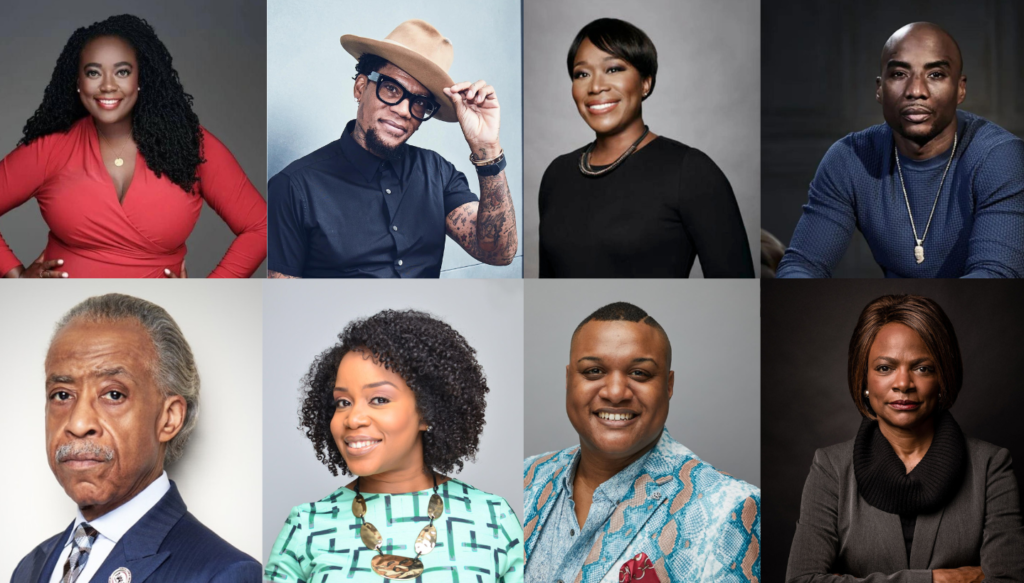
Black journalists, leaders and luminaries (clockwise) Ashley Allison, D.L. Hughley, Joy Reid, Charlamagne Tha God,Rev. Al Sharpton, Kimberly Atkins Stohr, Ernest Owens and Val Demmings
Joy Reid, the well-known host of MSNBC’s The Reid Out, caused some pearl clutching on both sides of the aisle when she proclaimed on July 3rd that she would vote for Joe Biden over Donald Trump, even if Biden were “in a coma.”
Reid took to TikTok to clarify her stance on the dust up within the Democratic Party over
whether Biden should step down following his disastrous debate performance on June 27th.
“Just let me know when you guys are finished figuring it out, Democrats,” said Reid. “Then let me know who I got to vote for…If it’s Biden in a coma, I’m going to vote for Biden in a coma.”
It wasn’t the most resounding endorsement of the president. But Reid was channeling the
sentiment across much of Black America, which has stood resolutely behind Biden in the wake of the debate.
While the rest of the Democratic Party dukes it out over whether Biden should step down as its presumptive nominee, African Americans are in a whole different head space. Among Black officials, celebrities and journalists who’ve gone on record, virtually all have said, in essence, “I’m ridin’ with Biden.”
Not only that, when calls for Biden to exit reached a crescendo the week before the assassination attempt on former president Donald Trump, Black folks were among the fiercest spokespersons challenging the Democratic Party to “Get a grip,” “Man up,” and “Stop all the hand wringing.”
To be clear, many African Americans share the concerns of some others over Biden’s age and mental fitness. But where we diverge is in our collective response to those opinions.
The recent New York Times/Sienna poll showed that 53% of African Americans feel Biden is
too old to be president, and nearly half (47%) feel we should have a different Democratic
nominee. Nevertheless, 73% of Black voters said they would vote for Biden if the election were held today.
And in battleground states, Biden’s Black support has gone up in recent months. According to polls commissioned by BlackPAC and conducted by Brilliant Corners, the percentage of Black voters who would vote for Biden if the election were held today rose from 50% in February to 65% in late June.
Why the Stark Racial Difference Among Democrats?
The reasons for our relative steadfastness have nothing to do with the frequent claim by
conservatives that African Americans have a sheep like loyalty to the Democratic Party.
Nor are we monolithic in fervor for Biden. The “Black wall” of support may appear to signal a unified opinion on the man himself. It does not.
If Black leaders and voters are unified around anything, it’s defeating Donald Trump.
Democratic strategist Ashley Allison captured the sentiment in a July 11th interview when she said, “I’m not super excited about Joe Biden, but I am terrified of Donald Trump… If Joe Biden stays in the race, I’m going to do every single thing I can to defeat Donald Trump because as a Black woman living in this country that has less constitutional rights than I had from the day that I was born 42 years ago, I refuse to live under Donald Trump’s reign again.”
Here are some of the factors driving African Americans’ decision calculus.
1. To Black Americans, Trump is a Triple Threat
“If you are a white straight male, you have the luxury of being disappointed if Trump is elected; for African Americans, it would be a disaster.” This is a paraphrase of comments by comedian D.L. Hughley in response to actor George Clooney’s editorial urging Biden to relinquish the nomination.
It’s clear that white Democrats see Trump as an existential threat to democracy. But African
Americans see Trump as a triple threat.
Not only has he had a corrosive effect on democratic systems, but his conservative movement has fueled an offensive to dismantle the architecture of equity and inclusion in all facets of life; and his culture war has caused a spike in physical harms and threats to African Americans.
Racially motivated anti-Black hate crimes have more than doubled since the year before Trump took office in 2016.
Our fears ring through in polling data. The BlackPAC survey this June asked African Americans to rank what they saw as the biggest threats to the Black community. No surprise: Trump getting elected again was number one, followed by Trump-related threats in second and third place – the rise in white supremacy and nationalism at number two, and the US Supreme Court rolling back rights and freedoms at number three.
Pioneering journalist Ernest Owens highlighted the racial difference in risk profiles in a recent piece for the Daily Beast. Owens wrote, “Too often, the most privileged feel entitled to cherry-pick its leaders and are often spared the vast consequences of whichever candidate is elected…In 2017, the celebrity and wealthy donors of Biden didn’t face the same harsh realities that everyday Americans, especially those who are Black and brown, of a Trump administration. Sure, they might have been mortified by a Trump presidency, but they remained rich and connected in ways that others weren’t.”
2. Biden Has Made Real Progress for Black Americans
For those who follow policy, the Biden presidency has resulted in tangible and significant gains for Black people.
On the domestic policy front, for example, the Biden administration has increased funding to Historically Black Colleges & Universities; increased federal funding to affordable housing; revved up Black business growth efforts and supplier diversity spending with minority owned firms; spearheaded student loan forgiveness; and adopted new accountability measures to ensure that dollars intended for community development reach more Black-led financial and development organizations in local communities.
Several leading Black advocates have vocally challenged Biden to move more aggressively in some policy genres, but there can be no question that the Biden-Harris White House has “put in the work” to advance racial equity.
Rev. Al Sharpton said on July 13th, after rattling off Biden policies that benefited African
Americans, “Black voters have a vested interest in protecting their interest. This is not about who’s winning a beauty contest or an age contest…Every group in America, including and especially Blacks, have to protect their interest, and Donald Trump has shown outright hostility to indifference around Black issues.”
3. What Other Choice Do We Have?
A significant slice of the Black electorate disagrees with Biden policies or is in the “double
hater” category, but is prepared to vote for him anyway, on the premise that they have no other choice.
Several media outlets have covered related trends such as anti-Biden sentiment among African Americans who disagree with the president’s actions on the Israel-Hamas war, and disaffection among the many Black voters who do not see the impact of Biden policies in their lives and communities.
Some of the beefs have been prominently aired by Charlamagne Tha God, born Lenard
McKelvey, the popular co-host of The Breakfast Club on iHeart. McKelvy is one of Biden’s
biggest critics and was among the first to say Biden should not be the 2024 nominee (months ago).
In a July 9th broadcast, he called for other Democrats to challenge Biden for the nomination (which conservatives seized on as further proof of the fracturing Democratic coalition).
Yet in the same broadcast, McKelvy mercilessly ripped Trump policies and declared the Trump-packed Supreme Court no longer legitimate.
“I may talk about Biden’s shortcomings,” McKelvy told Joy Reid earlier this year, “but Trump is the end of democracy as we know it.”
Reid herself has said, referring to Biden, “I don’t even really, in particular, like the guy. A lot of his policies? Don’t like them, [but] he’s not Donald Trump, right?”
The theme shows up in coverage by a half dozen media outlets. One example is featured in a June 24th article by NBC News, quoting Navy veteran Darren Reaves (a Black man) who considered voting for Trump, but has since changed his mind.
“I have no other choice but to vote for Biden. He’s not a felon,” Reaves said. Of Trump’s
messaging Reaves noted, “He’s promoting racism. He’s promoting dissension. He’s promoting dislike. He’s promoting ‘my way or the highway.’”
4. We Are Fine with VP Kamala Harris, Less So for Other Americans
For African Americans, Vice President Kamala Harris is the natural next step, if anything were to happen to Biden. Not so for many white Democrats who are calling for Biden to leave the ticket. Most who’ve spoken to reporters have either side-stepped the question of whether Harris should succeed Biden or spoken in favor of an open nomination process.
This is problematic for African Americans. In the words of Boston Globe columnist Kimberly Atkins Stohr during a July 3rd interview, “We have a Vice President, Kamala Harris, who stands ready should anything, God forbid, happen to Joe Biden. And all of this talk about him stepping aside because he can’t perform four more years is tremendously disrespectful to her.”
Atkins Stohr continued, “What I want is for Democrats to get a grip and to fight. That is what this moment needs. Not hand wringing and public bickering.”
Florida Congresswoman Val Demmings sounded a similar note on July 12th when she expressed disappointment that the Democrats calling for Biden to step down have not elevated Harris as a natural successor.
While reiterating her support for Biden to stay in the race, Demings said “I think it’s interesting that the 18 elected officials who have come out against President Biden have not given any options of who the Plan B would be, and I believe the only option is Vice President Harris.”
Glynda Carr was more direct in her message (Carr is president of Higher Heights for America PAC, a group that supports Black women voters, candidates and electeds).
Per reporting by The 19th, Carr said, “If the president and vice president were two White males, there wouldn’t be this strong discussion about who could or should be selected in the political process…[Harris] continues to show up every day, doing the job of the vice president.”
Carr warned that Black America is watching the issue closely, “We’re going to be very aware of how people continue to talk about [Vice President Harris] in this moment, about her readiness to lead, her qualifications, her experience.”
Whichever Way It Goes…
Whatever happens with Biden’s candidacy, the intraparty debate has amplified a few key
messages from Black America that Democrats should heed if they want to win this November:
– One, Black voters are “in it to win it.”
– Two, Most African Americans are not okay with the public beefing.
– And three, regardless of what happens next, we need fundamental change in the Democratic Party’s approach to the Black electorate. As Congressional Black Caucus Chair Steven Horsford told NBC, “That change needs to be focused on change in structure, change in strategy, [and] change in spending,” which he and his colleagues have been urging for months.
To feed back, email me at gypsy@powerbrokermagazine.com.


